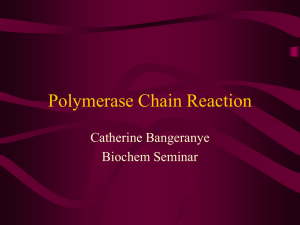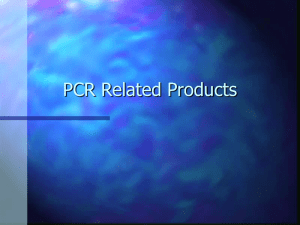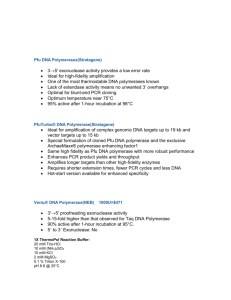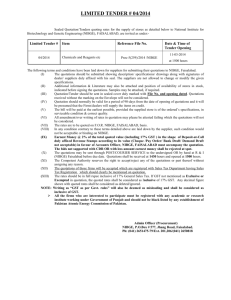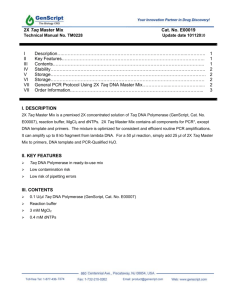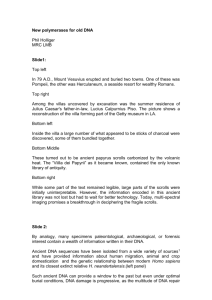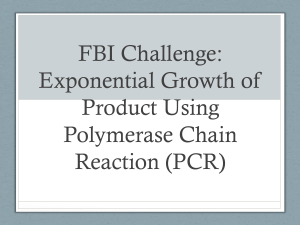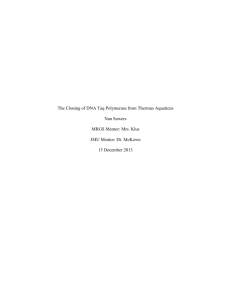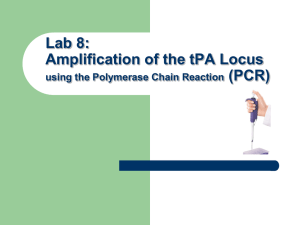Properties of Thermostable DNA Polymerase
advertisement
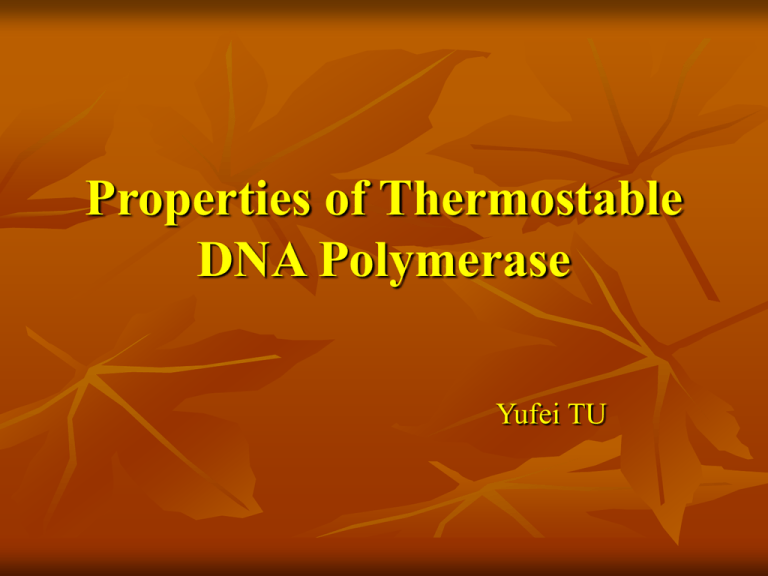
Properties of Thermostable DNA Polymerase Yufei TU Discovery--history of Taq DNA polymerase The original report of this enzyme, purified from the hot springs bacterium Thermus aquaticus, was published in 1976. Roughly 10 years later, the polymerase chain reaction was developed and shortly thereafter "Taq" became a household word in molecular biology circles. *THE DARNDEST PLACES: Scientists isolated the thermostable DNA polymerase Taq, an enzyme that drives PCR, from Thermus aquaticus Yellowstone type-1, a resident of geysers like this one at Yellowstone National Park. Properties The thermophilic DNA polymerases, like other DNA polymerases, catalyze template-directed synthesis of DNA from nucleotide triphosphates. A primer having a free 3‘ hydroxyl is required to initiate synthesis Magnesium ion is necessary. In general, they have maximal catalytic activity at 75 to 80℃, and substantially reduced activites at lower temperatures. At 37℃, Taq polymerase has only about 10% of its maximal activity. Taq DNA Polymerase Recombinant Taq DNA Polymerase is the enzyme of choice for most PCR applications. The half-life of enzyme is >40 minutes at 95°C. The error rate of Taq DNA Polymerase in PCR is 2.2x10-5 errors per nt per cycle; Other thermostable Polymerases In addition to Taq DNA polymerase, several other thermostable DNA polymerases have been isolated and expressed from cloned genes. Three of the most-used polymerases are described in the following table: Polymerase 3'->5' Exonuclease Source and Properties Taq No From Thermus aquaticus. Halflife at 95℃is 1.6 hours. Pfu Yes From Pyrococcus furiosus. Appears to have the lowest error rate of known thermophilic DNA polymerases. Vent Yes From Thermococcus litoralis; also known as Tli polymerase. Halflife at 95 C is approximately 7 hours. The Error Rate One of the most discussed characteristics of thermostable polymerases is their error rate. Error rates are measured using several different assays, and as a result, estimates of error rate vary, particularly when the assays are performed by different labs. The total error rate Taq Pfu 1 x 10-4 to 2 x 10-5 errors per base pair Vent between Taq and Pfu appears to have the lowest error rate at roughly 1.5 x 10-6 error per base pair Reliability/Fidelity Average error rates(mutation frequency/bp/duplication) increased as follows: Pfu (1.3 x 10-6) Deep Vent (2.7 x 10-6) Vent (2.8 x 10-6) Taq (8.0 x 10-6) exo- Pfu and UlTma (approximately 50 x 10-6). Reference Voet,D, Voet,J. Biochemistry Vol.1 3rd ed. Alberts, Johnson, Lewis. Molecular Biology of The Cell 4th ed. http://arbl.cvmbs.colostate.edu/hbooks/genetics/biotech/enzymes/hotpolys.htm l http://www.pubmedcentral.nih.gov/articlerender.fcgi?artid=146123&rendertyp e=abstract http://www.fermentas.com/techinfo/pcr/dnaamplprotocol.htm http://www.fermentas.com/techinfo/pcr/pcrprotocolpfu.htm
